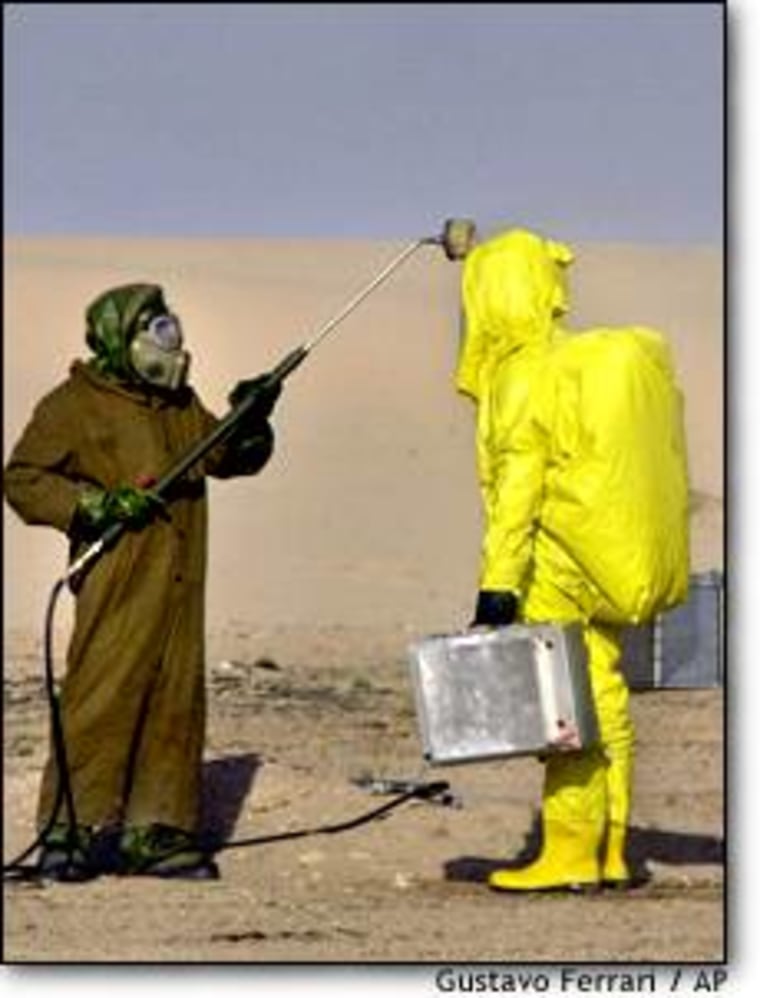While the chief U.N. weapons inspector is scheduled to arrive in Baghdad on Monday, U.N. diplomats believe a much more crucial date — and the one that could set the direction for Iraq’s fate — is Dec. 8, by which Saddam Hussein must declare whether his country possess weapons of mass destruction. If the Iraqi leader insists, as he has in the past, that Baghdad doesn’t have any banned weaponry, diplomats said it could make a U.S.-led war inevitable.
To date, Baghdad has flatly denied possessing any such biological, chemical or nuclear weaponry — a claim rejected by the United States.
“I’ll simply say that they do have weapons of mass destruction,” Defense Secretary Donald Rumsfeld said Thursday.
In a harshly worded letter to Secretary General Kofi Annan on Wednesday — in which Baghdad grudgingly accepted the latest U.N. resolution — Foreign Minister Naji Sabri asserted Iraq “has not developed weapons of mass destruction, whether nuclear, chemical or biological, as claimed by evil people.”
However, based on past experiences, that may not be Baghdad’s last word on the matter.
Under Resolution 1441, Iraq must provide by Dec. 8 “a currently accurate, full and complete declaration of all aspects of its programs to develop chemical, biological and nuclear weapons, ballistic missiles and other delivery systems,” including the locations where any such programs were developed.
CRUNCH TIME
Hans Blix, the chief U.N. weapons inspector, said Friday that the declaration deadline was one of the “most important moments we foresee.”
He hinted — and diplomats suggested — that Saddam could still amend the country’s past blanket denials when it comes to the crunch deadline.
Over the past 12 years, Baghdad has sharply shifted its position on its arsenal when taken to task by the United Nations — and Saddam may use the same ploy again to avert a showdown.
Moreover, a frank and honest declaration about its arsenal of banned weaponry may be the only way for Saddam to avoid confrontation, as long as the inspectors are then allowed to verify it and eventually destroy it.
Even a partial declaration of weaponry may be enough, as long as inspectors are not impeded in carrying out their duties.
“But if the declaration says, ‘We have nothing, we’ve destroyed it, everything is gone,’ then things would look ominous,” said one Security Council diplomat.
CLOUDS OF WAR
Others were more frank about what they see as the eventual outcome.
“No one thinks Iraq will meet the terms of the resolution,” said one diplomat. “Everybody realizes that war is coming.”
Another Security Council diplomat said that while his country was seeking a peaceful outcome, “most people here would think that given the tough language in Washington, it’s hard to see how we can avoid war.”
Under the U.N. resolution, a false declaration on Dec. 8 is not sufficient to constitute “material breach,” the trigger for military action. The resolution states that a false statement or “omissions” must be accompanied by “failure by Iraq at any time to comply with, and cooperate fully in the implementation of, this resolution.”
In other words, inspectors must also find prohibited weaponry, or be prevented from carrying out their mission.
U.N. diplomats believe that U.S. security agencies will provide substantial intelligence to Blix and his team when they begin their work in Iraq, allowing them put the Iraqis on the spot.
And many diplomats with the Security Council members believe the inspectors will find substantial violations by Saddam. As one diplomat remarked, “It’s hard to imagine Saddam changing his spots.”
However, another Security Council diplomat cautioned that while the media and elements within Washington were pushing the “showdown with Iraq” angle, there are “realists and pragmatists in Iraq and the United States,” who will do their best to avert a war.
He said he doesn’t expect his nation to be discussing the issue at the Security Council until 60 days after the inspections begin when Blix is obligated to report to the United Nations.
The only exception would be in the case of a “fundamental” incident involving the inspectors as they attempt to carry out their duties. “And we should not wish for such an incident.”
DIPLOMATIC PUSH
After two months of intense diplomacy by British and American officials, the 15 members of the council unanimously approved a resolution Nov. 8 that demanded Iraq’s full co-operation.
One of the main stumbling blocks during the protracted negotiations was Washington’s refusal to seek a second U.N. vote before launching military action.
In the end, Washington agreed that the Security Council should “convene immediately” upon receipt of any report of material breach by Blix in order to “consider the situation” but that it did not require a further vote.
One diplomat said that Washington was so confident that Saddam would be found in breach that the United States won’t jump on the first report of an infraction.
However, Secretary of State Colin Powell warned Thursday that Washington will not keep its powder dry forever.
“I think the U.S. has demonstrated considerable patience during the past two months,” he said. “That patience will continue, but at the same time I think it is absolutely necessary that there be no confusion, no misunderstanding, that if the Iraqis do not cooperate, do not work with the inspectors, then there will be consequences, and those consequences will be military force to disarm and change the regime.”
And he even raised the possibility that attacks on U.S. and British planes monitoring the so-called no-fly zones in southern and northern Iraq could be sufficient to trigger a U.S. attack.
However, one of the chief weapons inspectors, Mohammad ElBaradei of the International Atomic Energy Agency, was more cautious.
“If there is a minor omission and this is clearly not intentional, we are not rushing to the Security Council to say this is a material breach,” he said.
(Linda Fasulo is NBC’s U.N. correspondent. Sean Federico-O'Murchu is an international producer/editor with MSNBC.com.)
